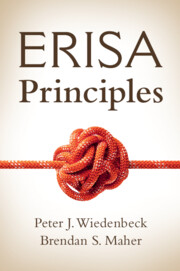Book contents
- ERISA Principles
- ERISA Principles
- Copyright page
- Contents
- Acknowledgments
- Table of Cases
- Table of Legislation
- Table of Rules and Regulations
- Part I General Considerations
- Part II Conduct Controls: Welfare and Pension Plans
- Part III Content Controls: Pension Plans
- 7 Accumulation
- 8 Distribution
- 9 Security
- Part IV Tax Controls: Qualified Retirement Savings
- Part V Health Plan Content Controls
- Appendix ERISA’s Legislative History
- Index
9 - Security
from Part III - Content Controls: Pension Plans
Published online by Cambridge University Press: 15 February 2024
- ERISA Principles
- ERISA Principles
- Copyright page
- Contents
- Acknowledgments
- Table of Cases
- Table of Legislation
- Table of Rules and Regulations
- Part I General Considerations
- Part II Conduct Controls: Welfare and Pension Plans
- Part III Content Controls: Pension Plans
- 7 Accumulation
- 8 Distribution
- 9 Security
- Part IV Tax Controls: Qualified Retirement Savings
- Part V Health Plan Content Controls
- Appendix ERISA’s Legislative History
- Index
Summary
ERISA converts pension claims from unsecured contract rights (that are implicitly contingent on the long-term financial health of the sponsor) into property rights by the requirement that defined benefit plans be funded and insured. The defined benefit plan funding, insurance, and termination rules illustrate the tensions and trade-offs between ERISA’s principal policies, particularly the delicate balance between the statute’s worker protection and pension promotion impulses. In response to public outcry over defeated worker expectations from terminated underfunded plans, Congress might have simply mandated periodic, simplified disclosure of the plan’s funded status and the sponsor’s financial condition, leaving it to workers to determine how much risk they were willing to bear and to take steps to protect themselves. Instead, Congress required systematic advance funding of accrued benefits, insisted that employers stand behind their pension promises by outlawing disclaimer of liability for unfunded benefits, and instituted a mandatory government-run insurance program to guarantee most pensions in the event that an underfunded plan is terminated and the sponsor is unable to make good the shortfall.
Keywords
- Type
- Chapter
- Information
- ERISA Principles , pp. 288 - 312Publisher: Cambridge University PressPrint publication year: 2024

